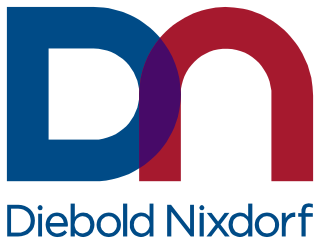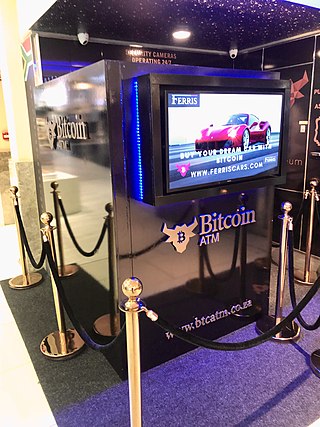
A debit card, also known as a check card or bank card, is a payment card that can be used in place of cash to make purchases. The card usually consists of the bank's name, a card number, the cardholder's name, and an expiration date, on either the front or the back. Many of the new cards now have a chip on them, which allows people to use their card by touch (contactless), or by inserting the card and keying in a PIN as with swiping the magnetic stripe. These are similar to a credit card, but unlike a credit card, the money for the purchase must be in the cardholder's bank account at the time of the purchase and is immediately transferred directly from that account to the merchant's account to pay for the purchase.

An automated teller machine (ATM) is an electronic telecommunications device that enables customers of financial institutions to perform financial transactions, such as cash withdrawals, deposits, funds transfers, balance inquiries or account information inquiries, at any time and without the need for direct interaction with bank staff.

NCR Voyix Corporation, previously known as NCR Corporation and National Cash Register, is an American software, consulting and technology company providing several professional services and electronic products. It manufactured self-service kiosks, point-of-sale terminals, automated teller machines, check processing systems, and barcode scanners.

Diebold Nixdorf is an American multinational financial and retail technology company that specializes in the sale, manufacture, installation and service of self-service transaction systems, point-of-sale terminals, physical security products, and software and related services for global financial, retail, and commercial markets. Currently Diebold Nixdorf is headquartered in the Akron-Canton area with a presence in around 130 countries, and the company employs approximately 23,000 people. Founded in 1859 in Cincinnati, Ohio as the Diebold Bahmann Safe Company, the company eventually changed its name to Diebold Safe & Lock Company. In 1921, Diebold Safe & Lock Company sold the world's largest commercial bank vault to Detroit National Bank. Diebold has since branched into diverse markets, and is currently the largest provider of ATMs in the United States. Diebold Nixdorf was founded when Diebold Inc. acquired Germany's Wincor Nixdorf in 2016. It is estimated that Wincor Nixdorf controls about 35 percent of the global ATM market.
CEN/XFS or XFS provides a client-server architecture for financial applications on the Microsoft Windows platform, especially peripheral devices such as EFTPOS terminals and ATMs which are unique to the financial industry. It is an international standard promoted by the European Committee for Standardization. The standard is based on the WOSA Extensions for Financial Services or WOSA/XFS developed by Microsoft.
A payment system is any system used to settle financial transactions through the transfer of monetary value. This includes the institutions, payment instruments such as payment cards, people, rules, procedures, standards, and technologies that make its exchange possible. A common type of payment system, called an operational network, links bank accounts and provides for monetary exchange using bank deposits. Some payment systems also include credit mechanisms, which are essentially a different aspect of payment.

Banca Comercială Română (BCR) is a Romanian universal bank. It is one of the main banks in Romania and is a subsidiary of Erste Group.

Mobile banking is a service provided by a bank or other financial institution that allows its customers to conduct financial transactions remotely using a mobile device such as a smartphone or tablet. Unlike the related internet banking it uses software, usually called an app, provided by the financial institution for the purpose. Mobile banking is usually available on a 24-hour basis. Some financial institutions have restrictions on which accounts may be accessed through mobile banking, as well as a limit on the amount that can be transacted. Mobile banking is dependent on the availability of an internet or data connection to the mobile device.

The Malaysian Electronic Payment System (MEPS) is an interbank network service provider in Malaysia. In August 2017, MEPS merged with Malaysian Electronic Clearing Corporation Sdn Bhd (MyClear) to form Payments Network Malaysia Sdn Bhd (PayNet).

Automated cash handling refers to the process of dispensing, counting, and tracking cash within various business environments such as banks, retail stores, check-cashing outlets, payday loan/advance providers, casinos, and more. This process is facilitated through the use of specially designed hardware and software, with the primary goals of preventing loss, deterring theft, and reducing the need for constant manual oversight of cash operations.

Euronet Worldwide is an American provider of global electronic payment services with headquarters in Leawood, Kansas. It offers automated teller machines (ATM), point of sale (POS) services, credit/debit card services, currency exchange and other electronic financial services and payments software. Among others, it provides the prepaid subsidiaries Transact, PaySpot, e-pay, Movilcarga, TeleRecarga and ATX.

National Financial Switch (NFS) is the largest network of shared automated teller machines (ATMs) in India. It was designed, developed and deployed by the Institute for Development and Research in Banking Technology (IDRBT) in 2004, with the goal of inter-connecting the ATMs in the country and facilitating convenience banking. It is run by the National Payments Corporation of India (NPCI). As on 31st January’ 22, there were 1,203 members that includes 111 Direct, 1,045 Sub members, 43 RRBs and 4 WLAOs using NFS network connected to more than 2.55 Lac ATM (including cash deposit machines/recyclers).
A payment processor is a system that enables financial transactions, commonly employed by a merchant, to handle transactions with customers from various channels such as credit cards and debit cards or bank accounts. They are usually broken down into two types: front-end and back-end.

Cash-in-transit (CIT) or cash/valuables-in-transit (CVIT) is the physical transfer of banknotes, coins, credit cards and items of value from one location to another. The locations include cash centers and bank branches, ATM points, large retailers and other premises holding large amounts of cash, such as ticket vending machines and parking meters.
Events in the year 1999 in China.

CB Bank is one of Myanmar's oldest and largest commercial banks. It became the first bank in Myanmar to issue ATM cards and credit cards. The bank, led by U Khin Mg Aye (Chairman) and U Kyaw Lynn (CEO) has over 200 branches across the country.

Bitcoin ATMs are kiosks that allow a person to purchase Bitcoin and other cryptocurrencies by using cash or debit card. Some Bitcoin ATMs offer bidirectional functionality, enabling both the purchase of Bitcoin and the sale of Bitcoin for cash. In some cases, Bitcoin ATM providers require users to have an existing account to transact on the machine.

The ATM Industry Association (ATMIA), originally the ATM Owners Association, was established in 1997 in the United States as a global nonprofit trade association to service an industry that built around the global growth of the ATM.
Digital banking is part of the broader context for the move to online banking, where banking services are delivered over the internet. The shift from traditional to digital banking has been gradual, remains ongoing, and is constituted by differing degrees of banking service digitization. Digital banking involves high levels of process automation and web-based services and may include APIs enabling cross-institutional service composition to deliver banking products and provide transactions. It provides the ability for users to access financial data through desktop, mobile and ATM services.
Banknote processing is an automated process to check the security features and the fitness of banknotes in circulation, to count and sort them by denomination and to balance deposits. This processing of currency is performed by security printing companies, central banks, financial institutions and cash-in-transit (CiT) companies.













